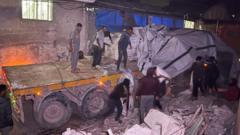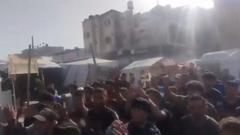Morgan Ortagus, the U.S. deputy Middle East envoy, meets with Lebanese leadership to address the recent escalations and the reconstruction efforts needed post-conflict.
**U.S. Diplomat Engages Lebanon Amid Heightened Tensions with Israel**

**U.S. Diplomat Engages Lebanon Amid Heightened Tensions with Israel**
A visit from a Trump administration official raises concerns over Hezbollah's influence and the fragile ceasefire in the region.
Amid renewed hostilities in the region, Morgan Ortagus, the U.S. deputy envoy for the Middle East during the Trump administration, visited Lebanon on Saturday, reflecting Washington's engaged approach to preventing further escalation. This visit occurs as tensions between Israel and Hezbollah have surged, jeopardizing a precarious ceasefire initially achieved in November.
During her meetings with senior Lebanese officials, including newly inaugurated President Joseph Aoun, Ortagus focused on crucial issues surrounding southern Lebanon. The Lebanese military is expected to gain control in this region, previously dominated by the Iran-aligned Hezbollah. As reports of recent rocket attacks from militants into Israel surfaced, Israeli forces retaliated with airstrikes near Beirut and in southern Lebanon, further aggravating the delicate peace.
Despite these tensions, both Hezbollah and Israel have shown reluctance to return to an all-out war. Hezbollah has distanced itself from the recent hostilities, indicating a desire to maintain stability, especially following the war that caused extensive devastation in Lebanon, resulting in around 4,000 deaths and significant displacements.
The Lebanese government’s recovery efforts have come under scrutiny, with the World Bank estimating war-related damages at $14 billion and stating that $11 billion is required for reconstruction. The ongoing dialogue between Ortagus and Lebanese leaders also touched on the need for financial reforms intended to bolster foreign aid flows, particularly from the United States.
Experts highlight that international assistance will likely hinge on Lebanon's ability to assert control and manage Hezbollah’s influence, which has remained a contentious issue within Lebanese politics since the group has long operated with considerable autonomy, often overshadowing the state's authority.



















